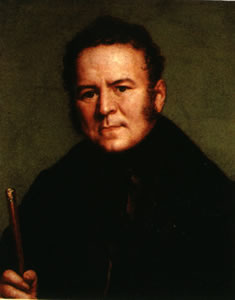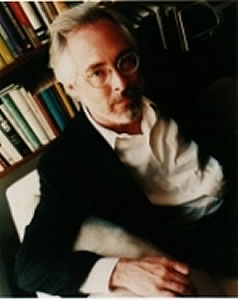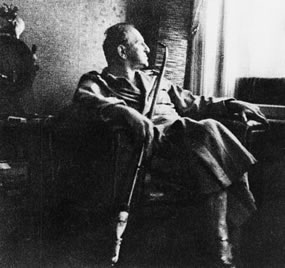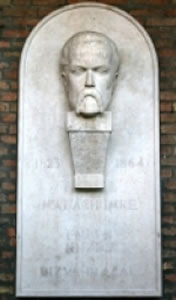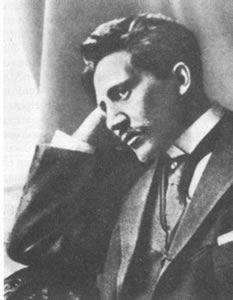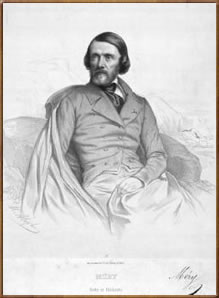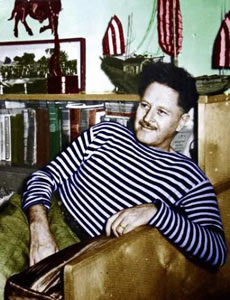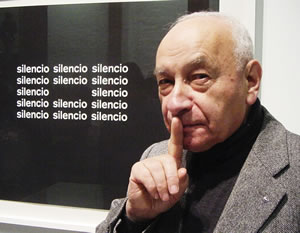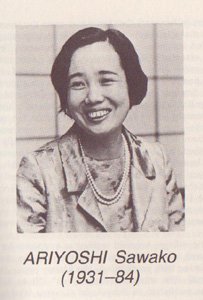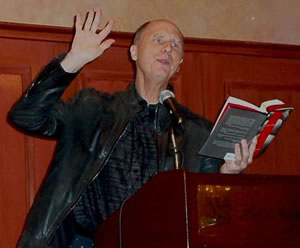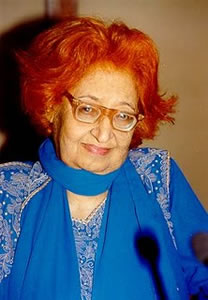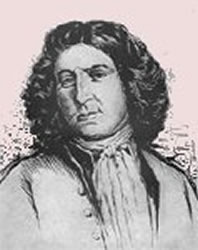De Elzasser dichter en schrijver Maxime Alexandre werd geboren op 24 januari 1899 in Wolfisheim. De familie was Duitstalig, maar wel francofiel. Kort voor WO I verhuisde de familie naar Lausanne in Zwitserland. Daar kwam Alexandre in contact met René Schickele en Romain Rolland. In Zürich leerde hij Hans Arp kennen. Begin jaren twintig verhuisde hij naar Parijs waar hij tot de surrealisten ging behoren rond André Breton, Robert Desnos en Benjamin Péret. Na WO II verwerkte hij veel van zijn traumatische ervaringen uit de oorlog in zijn werk. Onder invloed van Paul Claudel bekeerde hij zich tot het katholicisme en in 1949 werd hij gedoopt.
Hälfte des Lebens
Mit gelben Birrnen hänget
Und voll rnit wilden Rosen
Das Land in den See.
Ihr holden Schwäne,
Und trunken von Küssen
Tunkt ihr das Haupt
Ins heilignüchterne Wasser.
Weh rnir, wo nehm’ ich, wenn
Es Winter ist, die Blumen, and wo
Den Sonnenschein
Und Schatten der Erde ?
Die Mauern stehn
Sprachlos und kalt, im Winde
Klirren die Fahnen.
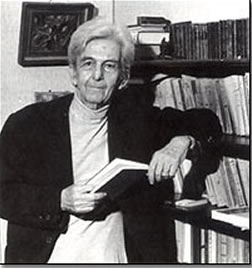
Maxime Alexandre (24 januari 1899 – 12 september 1976)
De Zwitserse dichter en schrijver Albin Zollinger werd geboren op 24 januari 1895 in Zürich. Hij groeide op in Rüti ZH en in Argentinië, waar zijn ouders een nieuw bestaan probeerden op te bouwen. In In Küsnacht volgde hij een lerarenopleiding. Hij kreeg uiteindelijk een vaste aanstelling in Oerlikon. In 1921 publiceerde hij zijn eerste roman. Zollinger is altijd naast zijn andere werk blijven schrijven. Het liefst deed hij dat in koffiehuizen. Legendarisch is zijn marmeren tafeltje in Café Terrasse, gedurende de jaren dertig.
Südliche Gesichte
In der Luft sind Bildhauer
Und das Meer.
Vulkane qualmen blaue
Pinienwälder!
Der braune Bauer pflückt Mais
Und singt irgendwo.
Kürbis badet im Kraut
Süss schwellender Klostergärten.
Und Gitter von Licht
Glimmen auf kühlen Fliesen,
In den Spiegeln der Mädchen,
Vor Altären.
Disteln im Maul
Wehklagen die Esel
Hinüber zu flimmernden Inseln.
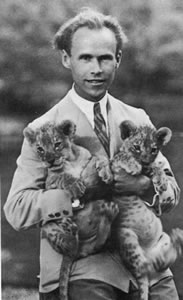
Albin Zollinger (24 januari 1895 – 7 november 1941)
De Australische schrijfster Ethel Turner werd geboren op 24 januari 1872 in Doncaster in England. Zij begon aan haar schrijversloopbaan toen zij op 18-jarige leeftijd samen met haar zus een krantke voor jonge mensen oprichtte. In 1896 trouwde zij met de advocaat Raine Curlewis. Zij verhuisden naar Middle Harbour. In het huis daar, Avenel, bleef Turner de rest van haar leven wonen. Haar bekendste boek is Seven Little Australians uit 1894. In 1939 werd het verfimd. In 1979 volgde een tiendelige tv-serie. Turner schreef veertig romans, kinderboeken, korte verhalen en gedichten.
Uit: Seven Little Australians
„It may be that the miasmas of naughtiness develop best in the sunny brilliancy, of our atmosphere. It may be that the land and the people are young-hearted together, and the children’s spirits not crushed and saddened by the shadow of long years’ sorrowful history.
There is a lurking sparkle of joyousness and rebellion and mischief in nature here, and therefore in children.
Often the light grows dull and the bright colouring fades to neutral tints in the dust and heat of the day. But when it survives play-days and school-days, circumstances alone determine whether the electric sparkle shall go to play will-o’-the-wisp with the larrikin type, or warm the breasts of the spirited,
single-hearted, loyal ones who alone can “advance Australia.”
Enough of such talk. Let me tell you about my seven select spirits. They are having nursery tea at the present moment with a minimum of comfort and a maximum of noise, so if you can bear a deafening babel of voices and an unmusical clitter-clatter of crockery I will take you inside the room and introduce them to you.
Nursery tea is more an English institution than an Australian one; there is a kind of _bon camaraderie_ feeling between parents and young folks here, and an utter absence of veneration on the part of
the latter. So even in the most wealthy families it seldom happens that the parents dine in sol
emn state alone, while the children are having a simple tea in another room: they all assemble around the same board, and the young ones partake of the same dishes, and sustain their parts in the conversation right nobly.“

Ethel Turner (24 januari 1872 – 8 april 1958)
De Amerikaanse schrijfster Edith Wharton werd geboren op 24 januari 1862 in New York. Zie ook mijn blog van 24 januari 2007 en ook mijn blog van 24 januari 2009.
Uit: The Lady’s Maid’s Bell
„It was the autumn after I had the typhoid. I’d been three months in hospital, and when I came out I looked so weak and tottery that the two or three ladies I applied to were afraid to engage me. Most of my money was gone, and after I’d boarded for two months, hanging about the employment agencies, and answering any advertisement that looked any way respectable, I pretty nearly lost heart, for fretting hadn’t made me fatter, and I didn’t see why my luck should ever turn. It did though – or I thought so at the time. A Mrs. Railton, a friend of the lady that first brought me out to the States, met me one day and stopped to speak to me: she was one that had always a friendly way with her. She asked me what ailed me to look so white, and when I told her, “Why, Hartley,” says she, “I believe I’ve got the very place for you. Come in tomorrow and we’ll talk about it.”
The next day, when I called, she told me the lady she’d in mind was a niece of hers, a Mrs. Brympton, a youngish lady, but something of an invalid, who lived all the year round at her country place on the Hudson, owing to not being able to stand the fatigue of town life.
“Now, Hartley,” Mrs. Railton said, in that cheery way that always made me feel things must be going to take a turn for the better – “now understand me; it’s not a cheerful place I’m sending you to. The house is big and gloomy; my niece is nervous, vaporish; her husband – well, he’s generally away; and the two children are dead. A year ago I would as soon have thought of shutting a rosy active girl like you into a vault; but you’re not particularly brisk yourself just now, are you? and a quiet place, with country air and wholesome food and early hours, ought to be the very thing for you. Don’t mistake me,” she added, for I suppose I looked a trifle downcast; “you may find it dull but you won’t be unhappy. My niece is an angel. Her former maid, who died last spring, had been with her twenty years and worshiped the ground she walked on. She’s a kind mistress to all, and where the mistress is kind, as you know, the servants are generally good-humored, so you’ll probably get on well enough with the rest of the household. And you’re the very woman I want for my niece: quiet, well-mannered, and educated above your station. You read aloud well, I think? That’s a good thing; my niece likes to be read to. She wants a maid that can be something of a companion: her last was, and I can’t say how she misses her. It’s a lonely life….Well, have you decided?”

Edith Wharton (24 januari 1862 – 11 augustus 1937)
De Franse toneelschrijver Pierre Augustin Caron de Beaumarchais werd geboren op 24 januari 1732 in Parijs. Zie ook mijn blog van 24 januari 2007 en ook mijn blog van 24 januari 2009.
Uit: Le barbier de Seville
“Acte II, scène 15
BARTHOLO, ROSINE
BARTHOLO le regarde aller.
Il est enfin parti. (À part.) Dissimulons.
ROSINE
Convenez pourtant, Monsieur, qu’il est bien gai, ce jeune soldat ! À travers son ivresse, on voit qu’il ne manque ni d’esprit, ni d’une certaine éducation.
BARTHOLO
Heureux, m’amour, d’avoir pu nous en délivrer ! Mais n’es-tu pas un peu curieuse de lire avec moi le papier qu’il t’a remis ?
ROSINE
Quel papier ?
BARTHOLO
Celui qu’il a feint de ramasser pour te le faire accepter.
ROSINE
Bon ! c’est la lettre de mon cousin l’officier, qui était tombée de ma poche.
BARTHOLO
J’ai idée, moi, qu’il l’a tirée de la sienne.
ROSINE
Je l’ai très bien reconnue.
BARTHOLO
Qu’est-ce qu’il te coûte d’y regarder ?
ROSINE
Je ne sais pas seulement ce que j’en ai fait.
BARTHOLO, montrant la pochette.
Tu l’as mise là.
ROSINE
Ah ! ah ! par distraction.
BARTHOLO
Ah ! sûrement. Tu vas voir que ce sera quelque folie.
ROSINE, à part.
Si je ne le mets pas en colère, il n’y aura pas moyen de refuser.
BARTHOLO
Donne donc, mon coeur.”

De Beaumarchais (24 januari 1732 – 18 mei 1799)
Standbeeld in Parijs
De Engelse dichter en edelman Charles Sackville werd geboren op 24 januari 1638. Zie ook mijn blog van 24 januari 2007 en ook mijn blog van 24 januari 2009.
Proud With the Spoils of Royal Cully
Proud with the spoils of royal cully,
With false pretence to wit and parts,
She swaggers like a batter’d bully
To try the tempers of men’s hearts.
Tho’ she appears as gay and fine
As jet and gems and paint can make her,
She ne’er shall win a heart like mine —
The devil or Sir Davy take her.
Her bed is like the Scripture feast,
Where none who were invited came,
So disappointed of her guest,
She took up with the blind and lame.

Charles Sackville (24 januari 1638 – 29 januari 1706)
Portret door Godfrey Kneller ui 1694, National Portrait Gallery, London
De Engelse dichter John Donne werd ergens tussen 24 januari en 19 juni 1572 geboren in Londen. Zie ook mijn blog van 24 januari 2007 en ook mijn blog van 24 januari 2008 en ook mijn blog van 24 januari 2009.
Holy Sonnet I: Thou Hast Made Me
Thou hast made me, and shall thy work decay?
Repair me now, for now mine end doth haste;
I run to death, and death meets me as fast,
And all my pleasures are like yesterday.
I dare not move my dim eyes any way,
Despair behind, and death before doth cast
Such terror, and my feeble flesh doth waste
By sin in it, which it towards hell doth weigh.
Only thou art above, and when towards thee
By thy leave I can look, I rise again;
But our old subtle foe so tempteth me
That not one hour myself I can sustain.
Thy grace may wing me to prevent his art,
And thou like adamant draw mine iron heart.

John Donne (24 januari 1572 – 31 maart 1631)
Icoon van Br. Robert Lentz, OFM
De Engelse schrijfster Frances Moore Brooke werd geboren op 24 januari 1724 in Claypole, Lincolnshire. Zie ook mijn blog van 24 januari 2009.
Uit: The History of Emily Montague
„I have this moment your letter, my dear; I am happy to hear my mother has been amus’d at Bath, and not at all surpriz’d to find she rivals you in your conquests. By the way, I am not sure she is not
handsomer, notwithstanding you tell me you are handsomer than ever: I am astonish’d she will lead a tall daughter about with her thus, to let people into a secret they would never suspect, that she is past five and twenty.
You are a foolish girl, Lucy: do you think I have not more pleasure in continuing to my mother, by coming hither, the little indulgencies of life, than I could have had by enjoying them myself? pray reconcile her to my absence, and assure her she will make me happier by jovially enjoying the trifle I have assign’d to her use, than by procuring me the wealth of a Nabob, in which she was to have no share.
But to return; you really, Lucy, ask me such a million of questions, ’tis impossible to know which to answer first; the country, the convents, the balls, the ladies, the beaux–’tis a history, not a letter, you demand, and it will take me a twelvemonth to satisfy your curiosity.
Where shall I begin? certainly with what must first strike a soldier: I have seen then the spot where the amiable hero expir’d in the arms of victory; have traced him step by step with equal astonishment and admiration: ’tis here alone it is possible to form an adequate idea of an enterprize, the difficulties of which must have destroy’d hope itself had they been foreseen.
The country is a very fine one: you see here not only the _beautiful_ which it has in common with Europe, but the _great sublime_ to an amazing degree; every object here is magnificent: the very people seem almost another species, if we compare them with the French from whom they are descended.“

Frances Brooke (12 januari 1724 – 23 januari 1789)
De Engelse dichter en toneelschrijver William Congreve werd geboren in Bardsey op 24 januari 1670. Hij is vooral bekend als een dichter van de comedy of manners. Congreves vader, een luitenant, was in Ierland gestationeerd, en de jonge Congreve ging in Kilkenny naar school; in 1686 ging hij aan Trinity College in Dublin klassieke filologie studeren. Door de nakende Glorious Revolution moest hij in 1688 naar Engeland uitwijken, waarna hij naar Londen verhuisde. In 1691 studeerde hij er recht.
Kort daarop begon hij toneelwerken te schrijven, na in 1692 het prozawerkje Incognita te hebben gepubliceerd. Hij was bevriend geraakt met John Dryden, die hem onder zijn hoede nam en in wiens vertaling van Juvenalis hij een satire voor zijn rekening nam. Naar eigen zeggen had Congreve reeds in 1690 zijn komedie The Old Bachelor geschreven; met de steun van Dryden werd het werk in 1693 opgevoerd, hetgeen zijn doorbraak betekende.
A Hue And Cry After Fair Amoret
Fair Amoret is gone astray–
Pursue and seek her, ev’ry lover;
I’ll tell the signs by which you may
The wand’ring Shepherdess discover.
Coquette and coy at once her air,
Both studied, tho’ both seem neglected;
Careless she is, with artful care,
Affecting to seem unaffected.
With skill her eyes dart ev’ry glance,
Yet change so soon you’d ne’er suspect them,
For she’d persuade they wound by chance,
Tho’ certain aim and art direct them.
She likes herself, yet others hates
For that which in herself she prizes;
And, while she laughs at them, forgets
She is the thing that she despises.

William Congreve (24 januari 1670 – 19 januari 1729)
Portret uit het atelier van Godfrey Kneller, 1709


